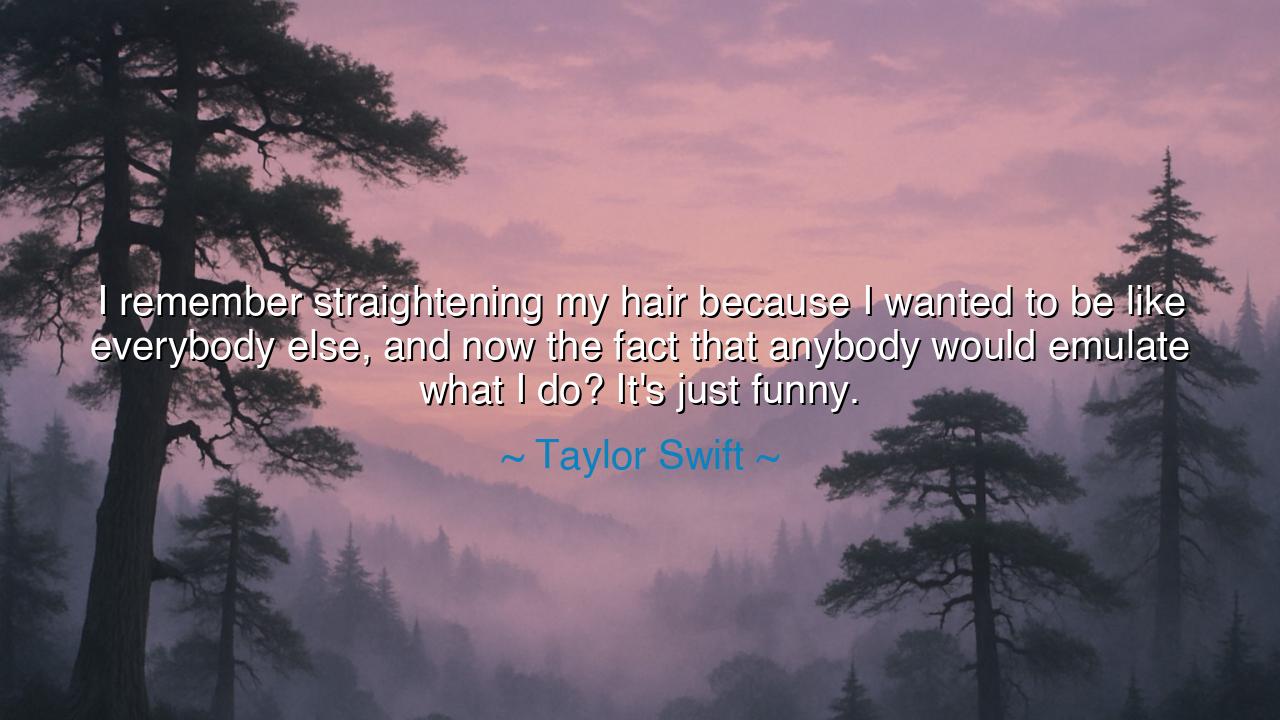
I remember straightening my hair because I wanted to be like
I remember straightening my hair because I wanted to be like everybody else, and now the fact that anybody would emulate what I do? It's just funny.






The words, “I remember straightening my hair because I wanted to be like everybody else, and now the fact that anybody would emulate what I do? It’s just funny,” were spoken by Taylor Swift, the singer-songwriter whose music has captured the hearts of millions and whose story embodies the evolution of self-acceptance. Beneath these simple words lies a timeless truth—one as old as humanity itself—that the desire to belong often precedes the discovery of one’s true self. Her reflection, tender and honest, reminds us that the path to individuality begins with imitation, and that only through time and struggle does one learn to embrace the beauty of being different.
In the style of the ancients, this saying can be seen as a lesson about identity, growth, and the illusion of conformity. When Swift speaks of straightening her hair “to be like everybody else,” she confesses a longing familiar to every soul—the yearning to fit into the pattern of the world, to silence the fear of standing apart. Yet the very act of trying to blend in often dulls the light that makes us unique. The ancient philosophers would have called this the battle between the authentic self and the mask of the crowd. For in every age, humanity has struggled with the same paradox: the hunger to belong, and the need to be free.
Swift’s humility—her amusement that others now “emulate what I do”—shows how life turns its wheel in irony. The young girl who once sought acceptance now stands as a symbol of it for others. This transformation mirrors the rhythm of nature itself: the seed must bury itself in darkness before it grows toward the light. Once, she looked outward for validation; now, by being true to herself, she has become the mirror through which others find courage. It is as if she says: The moment you stop chasing sameness, the world begins to admire your difference. And so her laughter—the “funny” she speaks of—is not arrogance, but awe.
There is an echo here of the story of Socrates, who in his youth sought the favor of Athens but later came to stand apart as its wisest critic. When he chose authenticity over approval, the city mocked him. Yet his legacy outlived his judges. Like Taylor Swift, he discovered that true influence comes not from imitation, but from integrity—from daring to be oneself in a world that rewards conformity. The ancients revered such courage as a mark of wisdom, for they knew that the one who follows the crowd can never lead it.
Swift’s words also carry a deeper emotional wisdom: that insecurity is often the seed of greatness. The child who hides her natural self may one day learn that her supposed flaws were her greatest gifts. Her curly hair, once straightened in uncertainty, becomes a symbol of freedom—the acceptance of self after years of trying to meet another’s image. This journey from imitation to individuality is the sacred rite of all creators, of all human beings who dare to grow. The poet must first echo other voices before finding her own song; the artist must first mimic the brushstrokes of others before painting from the soul. So too must the heart learn to unlearn its fear of being different.
Her story also reminds us that influence is born not from perfection, but from authenticity. Those who now emulate her do so not because she has achieved flawlessness, but because she has chosen honesty. The young woman who once feared being different now stands as proof that vulnerability can be a source of power. And here lies the great paradox: the very traits we once tried to hide often become the ones that inspire others most deeply. What we call “funny,” when viewed through wisdom’s eyes, is the irony of life’s poetry—how the shy heart becomes the voice of many.
So, my child, take this lesson to heart: do not seek to erase your difference, for it is the signature of your soul. Straighten not your curls, hide not your scars, and silence not your voice merely to please the crowd. The world may seem to reward imitation, but it is authenticity that endures. Like Taylor Swift, learn to laugh at the irony of your own transformation—to remember the moments when you longed to fit in, even as destiny was shaping you to stand out.
In the end, this quote is not merely about hair, fame, or beauty—it is about becoming whole. It teaches that the journey to self-love often begins in self-doubt, and that what once felt like weakness will one day be your strength. So walk boldly in your own shape, your own song, your own story. For there is nothing more powerful, nor more liberating, than to live as yourself—and to one day smile, as Taylor Swift does, at the wonder of how far you have come.






AAdministratorAdministrator
Welcome, honored guests. Please leave a comment, we will respond soon